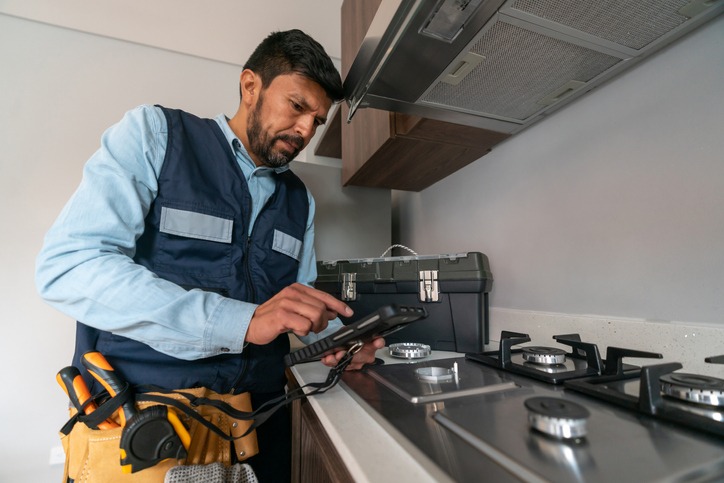Gas leaks can be a serious and potentially life-threatening issue. As a homeowner or a business owner, it’s important to understand the different types of gas leaks, their causes, and how to prevent them. Gas fitting is the process of installing and maintaining gas-related appliances and equipment. It’s essential to have a professional gas fitter handle any gas-related issues to ensure the safety of your property and those around you.
Types of Gas Leaks
There are three primary types of gas leaks: natural gas leaks, propane gas leaks, and carbon monoxide leaks.
Natural Gas Leaks
Natural gas is a common fuel source for heating, cooking, and other household appliances. This leak can occur when there’s a problem with the gas line or an appliance that uses natural gas. The gas is odourless, so gas companies add a distinctive odour to help people detect leaks. What exactly is the smell used to identify it? The smell is often described as a “rotten egg” odour.
Propane Gas Leaks
Propane gas is typically used for outdoor grilling, heating, and cooking. A propane gas leak can occur if there’s a problem with the propane tank or the gas line. Regarding smell, propane gas is similar to natural gas leaks because it also has a distinct odour added to help detect leaks.
Carbon Monoxide Leaks
Carbon monoxide is a colourless, odourless gas produced by burning fuel. You can expect carbon monoxide leaks to occur in homes and businesses when there’s a problem with gas or oil furnaces, water heaters, or other fuel appliances. Catching these leaks, in particular, are important since carbon monoxide poisoning can be deadly, so it’s essential to have working carbon monoxide detectors in your home or business.
Causes of Gas Leaks
Gas leaks can occur for several reasons. Some of the most common causes of gas leaks include faulty gas appliances, aging gas lines, and poor gas fitting.
- Faulty Gas Appliances: Gas appliances, like stoves, furnaces, and water heaters, can develop leaks over time. These leaks can occur due to wear and tear on the appliance, gas line damage, or a gas valve problem.
- Aging Gas Lines: Gas lines can deteriorate over time due to exposure to the elements or natural wear and tear. As gas lines age, they become more susceptible to leaks.
- Poor Gas Fitting: Gas fitting involves installing and maintaining gas appliances and equipment. When any gas fitting isn’t done properly, it can lead to gas leaks due to improper installation or maintenance of gas lines and appliances.
Signs of Gas Leaks
Knowing the signs of a gas leak is essential to take action quickly. Some of the most common signs of gas leaks include the smell of gas, a hissing sound, and dead vegetation.
- The Smell of Gas: Natural gas and propane have a distinctive odour added to help detect leaks. If you smell gas in your home or business, taking immediate action is important.
- Hissing Sound: A hissing sound can indicate a gas leak. If you hear a hissing sound near a gas appliance, it’s important to turn off the gas supply and contact a professional gas fitter.
- Dead Vegetation: If you notice dead vegetation near a gas line, it could indicate a gas leak. Gas leaks can cause plants to wither and die due to exposure to the gas.
Understanding Gas Leak Detection
Gas leak detection is the process of identifying and locating gas leaks. There are several gas leak detection methods, including gas detectors and gas leak detection solutions. Gas detectors can detect the presence of gas in the air. They’re typically installed in homes and businesses to warn early about gas leaks. Meanwhile, gas leak detection solutions involve a special solution applied to gas lines and appliances. If there’s a gas leak, the solution will bubble up, indicating the leak’s location.
Gas Leak Prevention
Preventing gas leaks is critical to ensuring the safety of your home or business. You can take several steps to prevent gas leaks, including regular maintenance, gas safety checks, and professional gas fitting.
- Regular Maintenance: Regular maintenance of gas appliances and equipment can help prevent gas leaks. It’s essential to have a professional gas fitter perform regular maintenance to ensure the safety of your home or business.
- Gas Safety Checks: Gas safety checks involve inspecting gas lines and appliances to ensure they function properly. It’s important to have a gas safety check performed by a professional gas fitter to ensure that your home or business is safe.
- Professional Gas Fitting: Professional gas fitting is essential to the safety of your home or business. A professional gas fitter can install and maintain gas lines and appliances to ensure they function properly and safely.
What to Do in Case of a Gas Leak
If you suspect a gas leak, taking immediate action is essential. The first step is to evacuate the building and call for emergency services.
- Evacuation: Evacuating the building is critical to ensuring your safety. Turning off all gas appliances and supplies before leaving the building is important.
- Call for Emergency Services: Calling for emergency services is essential in the case of a gas leak. Emergency responders will be able to safely shut off the gas supply and ensure the safety of your home or business.
Gas leaks can be a serious and potentially life-threatening issue. Understanding the different types of gas leaks, their causes, and how to prevent them is essential. Regular maintenance, gas safety checks, and professional gas fitting are critical to ensuring the safety of your home or business. If you suspect a gas leak, taking immediate action and evacuating the building are important. Remember, safety always comes first.

